Month: January 2023
How Much Does It Cost to Create a Social Media App?
Why social media?
It is obvious, that social media is extremely attractive for people of different ages and backgrounds. But common people are not the only ones who use social media. Another great segment of users are different businesses.
Three main goals: loyalty of the clients, communication and promotion, which may be achieved with the help of social media. Nowadays it is very hard for a company to find clients without using it.
The market size of social media applications
According to Grand View Research, in 2021 the global market size of social media apps was estimated at $39.7 billion. In 2022 it’s expected to reach 50.4 billion, growing at a CAGR of 23.4% from 2022 to 2028.
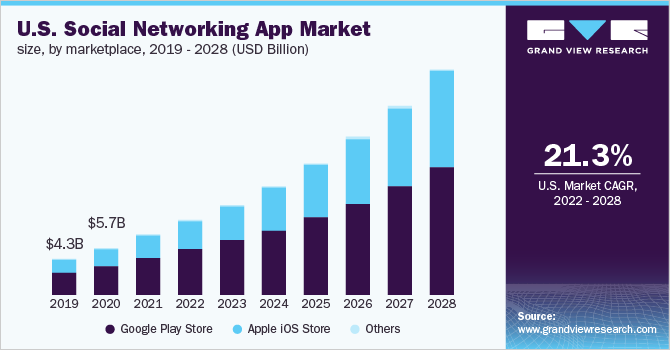
Are you considering building your social media platform yet? If so, building a social network application becomes necessary for its success. For example, according to the statistics the number of mobile app users of Facebook increased more than 4.5 times in four years, and it continues to grow. That means, that if there is only a web version of a social network, its popularity will increase greatly with creating an app. Another option is to make an application from scratch. As a professional team of developers, we are able to do both.
In this article, we want to answer an important question, which naturally arises for every social media startup creator – how much does it cost to develop a social media app? Here we’ll talk about native development, but the features can also be developed for a cross-platform app. If you think about using an app builder, check our article first: a builder won’t probably give you everything for your project to be successful.
Let’s start with high-level details and talk about what kinds of social media apps are there.
What kinds of social media are there?
Social networks may serve different goals, have a different focus, and attract different people. In general, there are 7 main groups.
Relationship networks
These social networks are the most numerous and widely used in the world. Though they weren’t the first on the Internet, they became the most popular. You probably use them every day, don’t you? So do millions of other people all around the world.
This big group can also be divided into 3 subgroups:
- personal contact networks
- professional networks
- datings
The first two kinds of relationship networks are the most interesting for business – and an account on Twitter, Facebook or Linkedin is a must-have for every company.
Media sharing networks
This kind of network provides great possibilities for users to share and create video and photo content. In addition, you can scale it – for example, create only short videos, or visa versa establish your own video channel. Different photo filters and interesting features make such networks even more successful than their competitors with more wide functionality.
Instagram, Youtube, Vimeo, and others are the most brilliant examples of this segment.
Online reviews
Such social networks let users make the best choice of service or products, relying on a great knowledge base. Location-based features are often used here for users to leave a review of local businesses. It really pushes forward the quality of service, because entrepreneurs have to work hard in order to gain good responses and remove reasons for bad reviews.
Tripadvisor, Yelp, and Foursquare are the biggest examples here.
Discussion forums
Forums, Q&A services, and communities were the first social media on the Internet. The main goal is to be useful, exchange knowledge and answer questions. For example, Quora provides answers from experts. Users of other forums usually provide links to expert articles or videos.
Social publishing platforms
Text and media content, blogging, and micro-blogging are the main things you’ll find here. Twitter and Tumblr can be a great help when sharing authors’ content and short notes.
Social publishing platforms probably generate the most traffic, as people are eager to create and share their content with the world. The most popular types of social media usually belong to this type
Bookmarking sites
StumbleUpon, Pinterest, Flipboard are services that are able to create a library of your favorite content. Usually, such networks pay attention to users’ interests and then make it possible to share them with subscribers.
Interest-based networks
In this type of network, people seek common interests – finding people who like the same things as you do is the best possibility there is to offer. That is why interest-based networks are so popular. For example, Last.fm is created for music lovers, and Goodreads – is for those, who cannot imagine their lives without books.
Whatever kind of social network you have or want to create, making mobile software is a must: it attracts new users, enriches their user experience, and allows them to use the app in any location. So, what should social networking apps look like? What features are necessary? In order to find this out, we need to determine, what makes a social network social.
The fastest growing social media apps in the past years
Let’s talk about the largest and fastest growing social media applications in recent years. Here’s what the situation looks like in 2022, with the top 10 largest and most popular applications in the world.
| Monthly active users | Revenue | Launched in | |
| 2.9 billion | $85.96 billion | 2004 | |
| YouTube | 2.2 billion | $28.8 billion | 2005 |
| 2 billion | $5.5 billion | 2009 | |
| 2 billion | $24 billion | 2010 | |
| TikTok | 1 billion | $11 billion | 2016 |
| Snapchat | 538 million | $1.06 billion | 2011 |
| 444 million | $575 million | 2005 | |
| 430 million | $289.9 million | 2010 | |
| 250 million | $12. 4 billion | 2006 |
While Facebook is still the largest social media, it’s slowly losing its young audience. TikTok which has been around for just 6 years, is currently the fastest growing social media network, and other social media platforms like Instagram are desperate to catch that wind. That’s why they implemented Reels that copy the functionality of TikTok. TikTok’s revenue grows as fast as its active user base: In 2021, it generated $4.6 billion, a 142% increase year on year.
Main features
Social media app development cost depends highly on the features you want to see in it. Naturally, there is a list of must-have features – without them, a social network won’t really be complete. So what exactly are they?
1. Onboarding of users
This feature is very important. Think of the first thing you see when you want to join a social network. If you have a profile, you need to somehow log in to leave comments, share information, and customize your profile. Authentication is also important for security – you don’t want your users to feel insecure about their personal information.
2. Profiles
A personal profile is probably the first thing you will encounter. It serves as an instrument for self-expression and individuality. Nowadays many social networks add new possibilities to make the users’ profiles even more fun and unique. Fancy photo filters, animated lists of interests, colorful backgrounds… All of these let the user customize the profile however he or she wants.
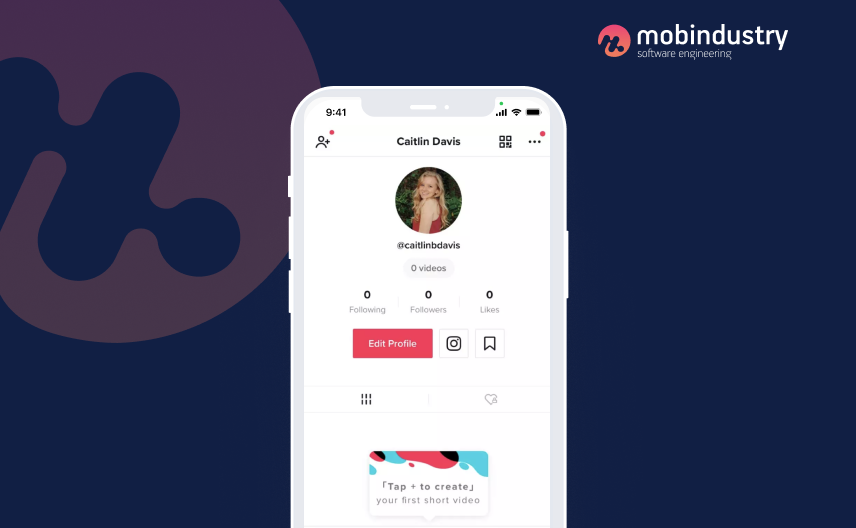
Almost every social network, especially of a personal relationship type, is built around profiles. But Youtube, on the other hand, is focused more on videos, and Snapchat – is on photos.
3. Content creation and sharing
No social network is possible without these possibilities – in order for people to communicate, they need to have content to share. The latest tendencies in social network business make visual content the most important.
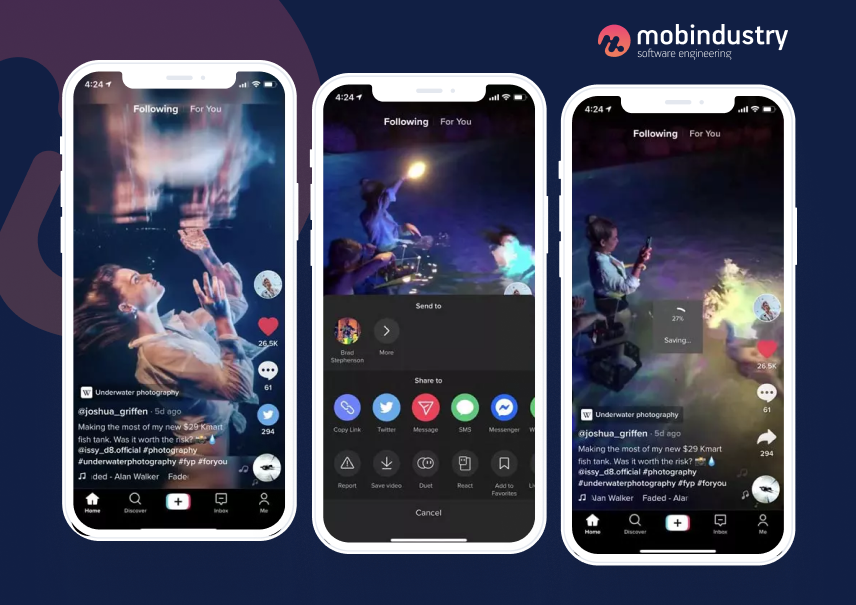
The text became less interesting for users, so make sure your app is full of bright pictures and engaging videos.
4. Feed
Feed is a feature you definitely want in your app. It allows the user to get new information, attune it to his or her needs, and use the app constantly.
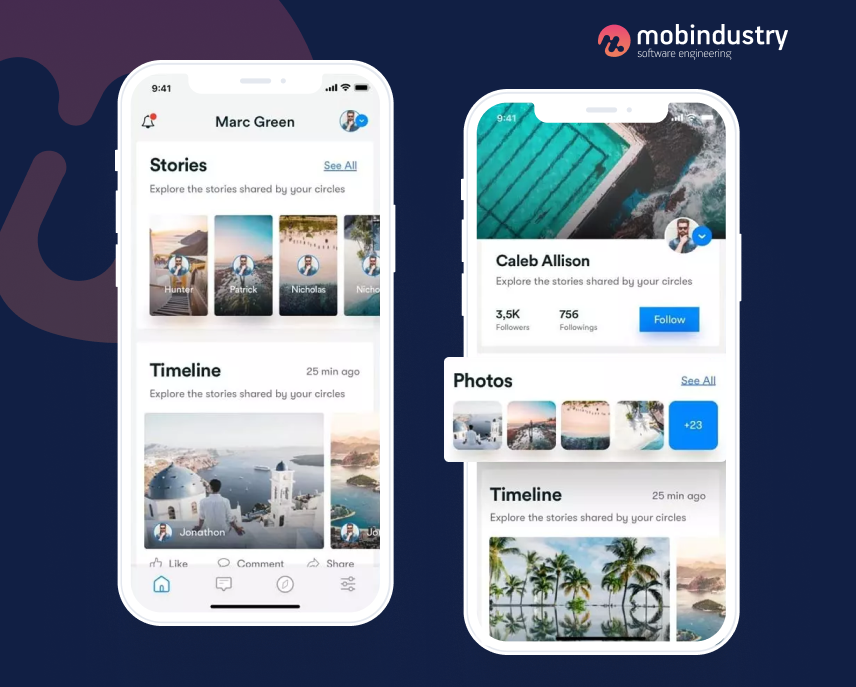
5. Communication tools
Connecting with other people is vital for every social media app. Where else can a user discuss any topic privately with other person or a group of friends or business partners?
Such tools include:
- direct messages
- instant messaging
- audio chats
- video chats
- group chats
6. Comments and feedback
Leaving comments and likes is one of the most interesting features for users because social networks are all about sharing opinions.
7. Search
While the majority of people use social media to find friends and content, it is necessary to provide them with a convenient search system. This system has to include filters and sorting.
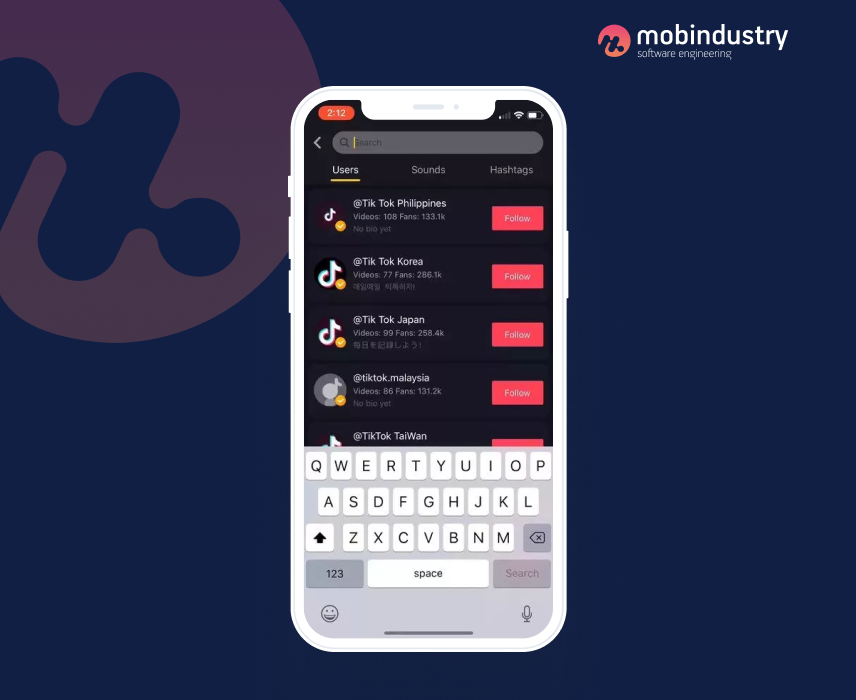
In addition, there is a possibility to search posts and media materials using keywords or hashtags.
8. Contact management
Contact management is a feature that helps users stay in contact and attract new people to your social network. It includes such options:
- adding friends
- inviting new users
9. Notifications
Probably no application is able to survive without notifications. They are needed to remind and return user into the app again and again. Push notifications are especially good to achieve this goal.
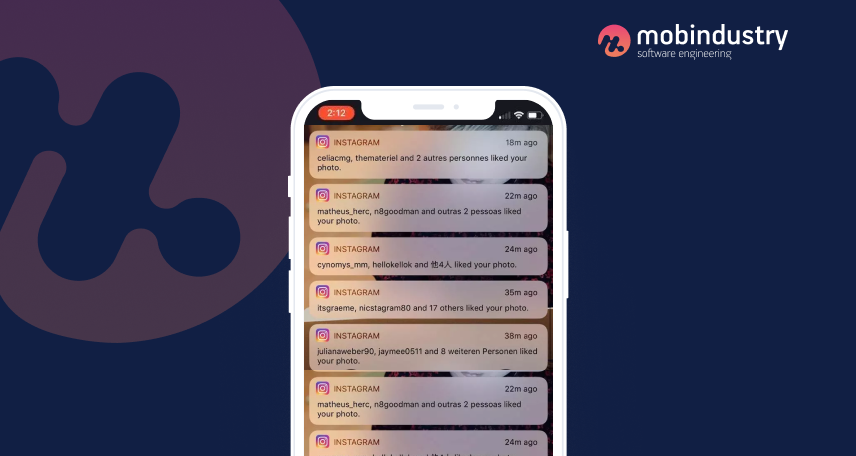
It is a feature that will let a user set every single option available according to wishes and desires. Custom settings can be included as well.
Optional features
These are the features that will serve the goal of your application and make it stand out from the crowd. For example, if social media is built around events, it is a must to have a calendar and event feature. If the main idea is shopping, photos, camera rows and geolocation are the right solutions for success.
So, optional features may include:
- geolocation
- synchronization with other social networks
- offline work
- tutorial guides
- user activity history
- gamification of the user experience
There is a great number of optional features you can add to your app, and the cost of social networks app development will vary accordingly.
Technology stack for a social networking app
A social networking application is rather simple when it comes to technology. The main difficulty is the number of features and the need for dynamic data exchange.
Mobile app tech stack:
- Swift (iOS)
- Kotlin (Android)
- React Native
- Flutter
Location-based services:
- Google Maps
- Apple Maps
Backend and admin panels
for you (programming language and frameworks):
- PHP (Symfony/Laravel)
- Python (Django/Flask)
- Ruby (Ruby on Rails)
Databases
- MongoDB
- PostgreSQL
- MySQL
Server
- DigitalOcean Cloud Services
- Amazon Web Services
- Linode
- Vultr
- Microsoft Azure
Web servers
- Apache HTTP Server
- Nginx
Caching tool
- Redis
- Memcached
TikTok as an example of a successful social media app
TikTok has taken the world by storm in 2019-2020, and despite all the political scandals between the US and China, it’s still one of the hottest apps that continues to generate crazy traffic and hype on all other social media platforms like YouTube, Instagram, Twitter, and Facebook.
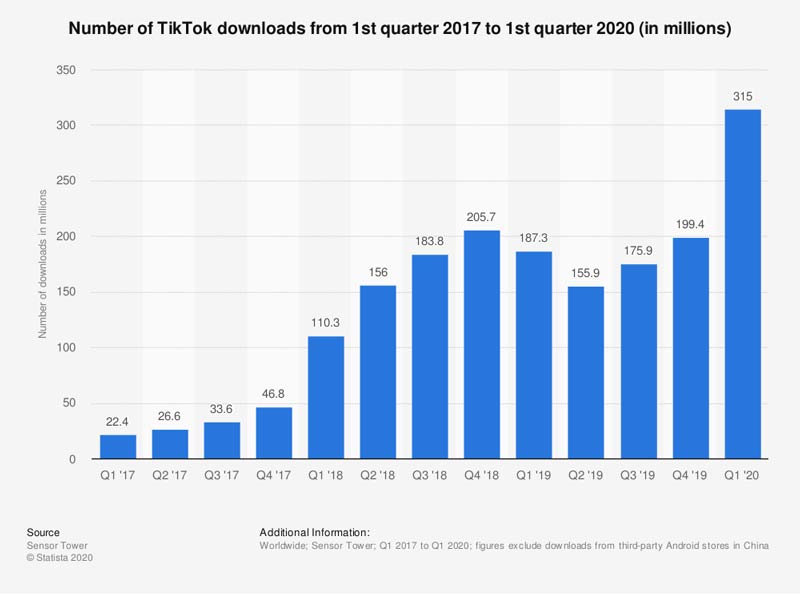
In 2020 TikTok released a report where it boasts 800 million active monthly users. In January 2019, there were only 300 million. What’s the secret of TikTok success?
For sure, their unique user experience and business model were the main part of their success. Endless newsfeed with the most attractive form of media – video – that’s what attracted users from all over the world. Thanks to its algorithms, TikTok is able to cater to any user, and hook them up with videos that are easy to both watch and record.
TikTok has also taken its core audience into consideration: most TikTok users are teenagers who are used to fast content consumption: a 15-second video is a perfect format for them. Content is king in TikTok, and even if you don’t have a massive follower base, your video can still go viral. This is what attracts users to TikTok, and currently, many social media platforms try to copy this success.
What other factors can make a social media platform successful? Let’s look into it.
Success factors
These factors are crucial if you want your app becomes successful, build users’ trust and bring them the most pleasant impressions of your app.
- Appealing design, intuitive UI and UX, engaging animation
- High speed
- Great variety of possibilities for content creating and sharing, open social network
- A clear understanding of the target audience
- Easy way of communication between users
- Security of personal and financial information
Stages of development
There is a classic scheme for any application development, and you can use it to create your own social network app. There are a few extra things you need to consider during the process of social media application development.
Product visioning
Product visioning is the first stage of creating a social network app. You need to have a clear vision of why you want to create your own social media and what people will use it. In a world where there are Facebook, Instagram, and Twitter, you need to come up with an original idea that will make your social media different. The latest example of this is TikTok which is currently becoming more and more popular.
If you feel a lack of expertise in a mobile market, you can address a social network app development company that will assess your idea and make market research to figure out how your idea can be improved from a mobile market standpoint.
UI/UX design
User interface design is extremely important for a social media application. If you want to attract a young audience starting from millennials, you need to wrap your product in a beautiful, yet simple design. User experience is even more important. The transitions between screens have to be logical and intuitive. Make sure you don’t require unnecessary actions from users when you create social network app wires.
Architecture design
First, it is important to decide, which kind of app it will be. In general, all apps are divided into two big groups – native and cross-platform ones. We work with native ones, and there are several reasons for that. Native applications are designed specifically for a certain operating system, whether it’s Android or iOS. Cross-platform ones can work on both OSs, that is why it is cheaper – you don’t have to hire several developers for each OS if you want to develop a social media app for an android device as well as for an iPhone. A cross-platform solution can also give you the ability to wrap your existing website into a mobile solution.
On the other hand, they have their limitations: it is usually less convenient to use a cross-platform app. Moreover, it is not able to use all the functions within a mobile device like geolocation, etc.
Our social media app developers make both native and cross-platform applications, and in both cases, they make sure that the product, in the end, will meet and outperform users’ expectations.
When developing your future app architecture, you need to think about scalability: how many users do you plan to have in three months? In a year?
The architecture of your app is the first stage of preparation for the actual development. To make sure the application is scalable and easy to maintain, you need to create a base for it first, which is architecture.
Usually experienced developers are responsible for creating an architecture, as they know all ins and outs of a development process and can foresee it. There are many types of architectures, and a skilled developer can tell you which one is the best for your project.
Architecture also involves a backend solution for traffic load. When the traffic of an app increases, it must be able to handle it, otherwise, it will crash. For this not to happen developers act accordingly to the client’s plans about the predicted number of users. If the rapid escalation of traffic is expected, there is a possibility to use other options, provided by servers. As you can see, there are lots of things to consider before you even start to make your own social media app.
Development and testing
Development and testing are two inseparable processes. They usually occur almost simultaneously. At Mobindustry we prefer to use Continuous integration: it ensures the quality of an app and accelerates the development process.
The best practice of development is to create a strong connection between a development team and a quality assurance team. To have them in the same office is the best option, as they’ll be able to communicate effectively and solve any issues at once.
Publishing
When the app is finally ready, you need to make sure it corresponds to GooglePlay or AppStore rules. It is extremely important, otherwise, it will be impossible to land an app on the store and promote it. The rules are quite numerous and they include an absence of improper content, created in your app, and an ability to complain about it.
How much does it cost to make a social media app?
Now we will give you an answer, you waited for so long. We have discovered that the cost of developing a social media app primarily depends on which features you want to see in your future product. You’ll also need to consider paid third-party services like maps, payments, and cloud services in your budget.
In general, there are two ways you can pay a social media app development company for developing your application:
- fixed price
- hourly-based price
A fixed price scheme means that you and the company of developers will agree on a certain price for the whole project. It is usually based on a detailed plan of a development process, and the price for an hour is a bit higher than usual, because of the possible risks.
At the same time, an hourly-based contract means you will pay money for the number of hours, spent on each stage of the development process. In this case, it is much easier to change the project in the course of its development and to control it more effectively.
Factors that impact development cost
Whether you choose a fixed-price or a time and material contract, the developers will be paid for the number of hours they work – factual or estimated. The price per hour is very different in each country. Check it out in the infographic below!
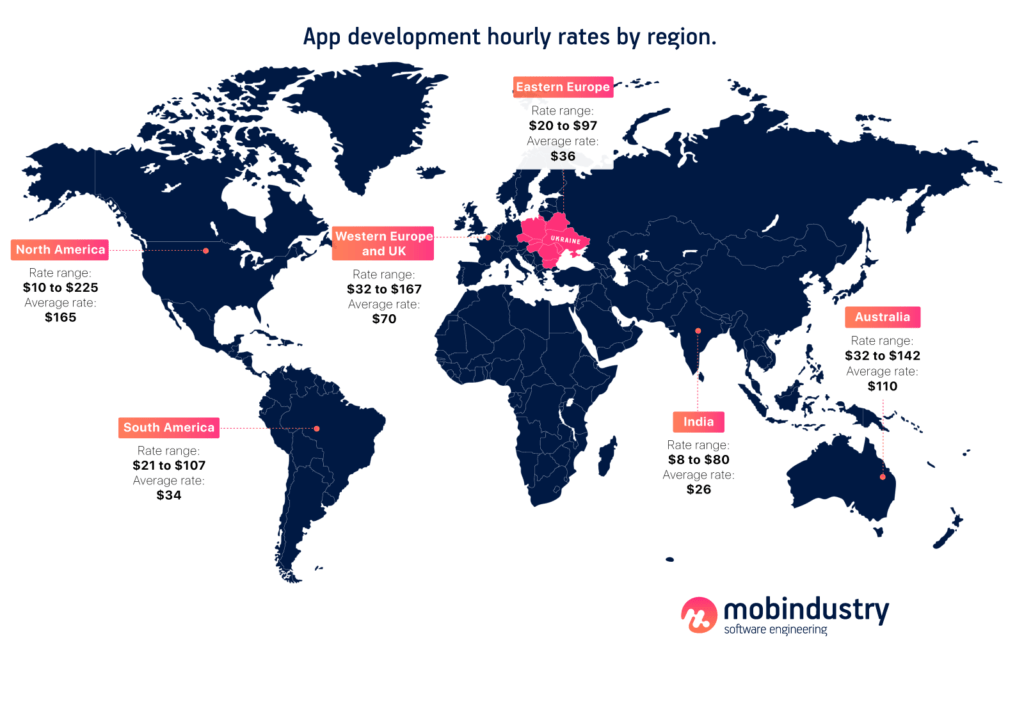
Needless to say, hiring developers from either Eastern Europe or India will make much more profit, as the number of hours will stay the same on average, but the price for them will determine the cost of the whole project. If you make a social media app in, say, North America, you’ll pay $40k for the whole project. The very same development will cost you $15-20k in Eastern Europe.
Other factors that influence the cost of social media app development include:
- number of features and their complexity
- the complexity of design, animations
- cost of third-party services
- technology stack
- number of platforms
The biggest factors are of course the scope of work and the cost of the developer’s hour or work.
The next infographic will show you, how many hours a team of developers need to implement different features in your application.
| FEATURES | HOURS OF DEVELOPMENT |
| Onboarding | 80-160 |
| Personal profiles | 60-130 |
| Content creation | 40-220 |
| Feed | 40-180 |
| Communication tools | 80-600 |
| Comments | 70-200 |
| Search | 80-180 |
| Contact management | 30-140 |
| Notifications | 30-100 |
| Settings | 20-80 |
You may be wondering, why the difference between the minimum and maximum amount of hours is so big. Well, the fact is that the features can vary in their complexity. For example, the notification can be the simplest – with the text only, or it may be full of buttons, profile photos, animations, and functions. So, the number of hours, the developer will spend, depends on this.
Now check out the hours for adding optional functions here:
| OPTIONAL FEATURES | HOURS OF DEVELOPMENT |
| Geolocation | 70-300 |
| Offline logic | 30-140 |
| Sync with other social networks | 20-70 |
| Tutorial guides | 15-40 |
Conclusion
Now it is not so hard to imagine, how much a social media app will cost. There are many details you should consider, such as:
- the type of your social app and your target audience
- main features you want to focus on
- optional features that will best suit your vision and needs
- developer team that will build a social media app at a best price/quality ratio
Building apps of this kind is usually a complex project. That is why we recommend using an MVP approach to test the product concept first.
With social networking app development being one of our core specialties, we are ready to consult and support your development project. If you think about creating a social media platform, don’t hesitate to contact us. We can consult you on how to create a social network app from scratch, and also create a social media app with your target audience in mind.

